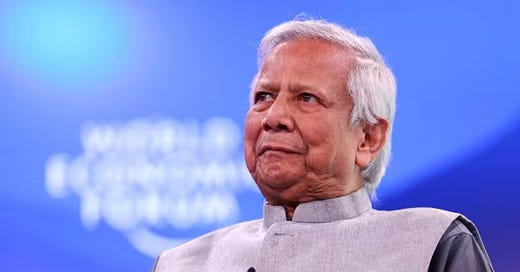Bangladesh's Growing Challenges
Interim Government in Faces Popular Anger and Accusations of Authoritarianism

The interim government in Bangladesh, led by Nobel laureate Mohammad Yunus, is facing growing challenges after its failure to set a date for general elections in the country. Several groups, including government employees, have accused the interim government of misusing its power to silence dissent in order to prolong its time in power.
Thousands of government employees continued their protests on Tuesday 27 May, for the fourth consecutive day in Dhaka.
The employees are demanding the withdrawal of an ordinance recently issued by the interim government, which allows it to dismiss any employee from service by merely issuing a show-cause notice without following any requirement for a formal inquiry or other proceedings.
The Public Service (Amendment) Ordinance 2025 was approved by the interim government on Thursday. Employees have termed the changes in the Public Service Act “unlawful” and “repressive” and refused any compromises until the ordinance is completely withdrawn.
Dhaka police imposed a ban on rallies and gatherings in and around government secretariats on Monday. Hasnat Abdullah, leader of the National Citizens Party (NCP)—a newly formed party of student agitators who led the anti-quota agitations last year—threatened the employees of grave consequences if the protests continued. He also accused the protesting employees of being supporters of former Prime Minister Sheikh Hasina and her party, the Awami League. NCP is part of the interim government led by Yunus.
The employees announced a day’s halt in the agitation Tuesday afternoon, following the government agreeing to talk with their representatives.
IMF dictates government policies
The employees in the secretariat are not the only group protesting against the interim government. On Monday, thousands of primary school teachers from across the country also protested, demanding higher wages and other benefits, Prothom Alo reported.
Meanwhile, on Sunday, the government was forced to withdraw an order to bifurcate the National Board of Revenue (NBR), after hundreds of employees started agitating against the move they allege was pushed by the International Monetary Fund (IMF).
The IMF had approved a USD 4.7 billion loan for Bangladesh in January 2023. The third and last installment of the loan was delayed due to non-fulfillment of certain conditions by the interim government. The conditions includedimproving revenue collection and reducing subsidies.
Shamshir Sharif, a member of the Workers Party of Bangladesh, spoke to Peoples Dispatch and claimed that the bifurcation of the NBR was done in order to fulfill the IMF’s conditions. The Yunus government, while executing the orders of the IMF, failed to gain the buy-in of the employees—a standard practice in executing “reforms” under the interim government, Sharif claimed.
National elections
The Yunus-led interim government is also facing pressure to conduct national elections as soon as possible. The right-wing Bangladesh Nationalist Party (BNP)—which emerged as the main political party in the country after the interim government banned the Awami League earlier this month—is pressuring the government to conduct elections by December.
Yunus, however, has been pushing for a delay in elections until at least June 2026, claiming that the reforms to the political system should be completed before new elections are held.
This, however, has angered the army chief Waker-Uz-Zaman. Last week, he publicly expressed dissatisfaction over the country’s political situation and supported the calls for general elections by December.
The disagreement led to rumors of Yunus’ resignation, citing that he is frustrated over the delayed reforms in the country’s political structure. He had promised large-scale reforms in the political system after taking charge of the interim administration following the resignation and self-exile of former Prime Minister Sheikh Hasina in August of last year. Hasina left the country after months-long popular protests against her government.
The rumors of Yunus’ resignation were later dismissed by his colleagues in the interim government.
Lack of accountability
Yunus held a meeting on Sunday with all political parties, including the BNP, in order to reach a consensus on the date of elections. Yunus blamed the Awami League for the unrest in the country, claiming Bangladesh is in a war-like situation both internally and externally, and demanded that political parties show patience so that reforms can be completed.
Questioning the real intentions of the interim government and blaming it for the failures on multiple fronts, the Workers Party of Bangladesh (WPB) issued a statement on Saturday. It dismissed the claims made by Yunus about the reforms and questioned his government’s undemocratic approach of taking major decisions without national consent. The party also demanded early elections.
Yunus is trying to buy himself time by blaming the League for the growing popular disapproval with his government, claimed Sharif. Certain decisions taken by the interim government, for example the one related to the Rakhine Corridor with Myanmar, and attempts to control government employees, have not gone over well with the people and created a breach of confidence. If the elections are delayed any further it may spark a full crisis for Yunus and his government, Sharif told Peoples Dispatch.
Yunus’ government had agreed to open a corridor for the US and other international agencies to deliver aid through the country to Myanmar’s Rakhine region. The so-called humanitarian corridor is considered an assault on the country’s sovereignty as it is largely seen as a US geopolitical move against China in the region. Left parties in the country have protested against the Yunus government’s decision to allow the US to use Bangladesh’s land for geopolitical games against another country.




